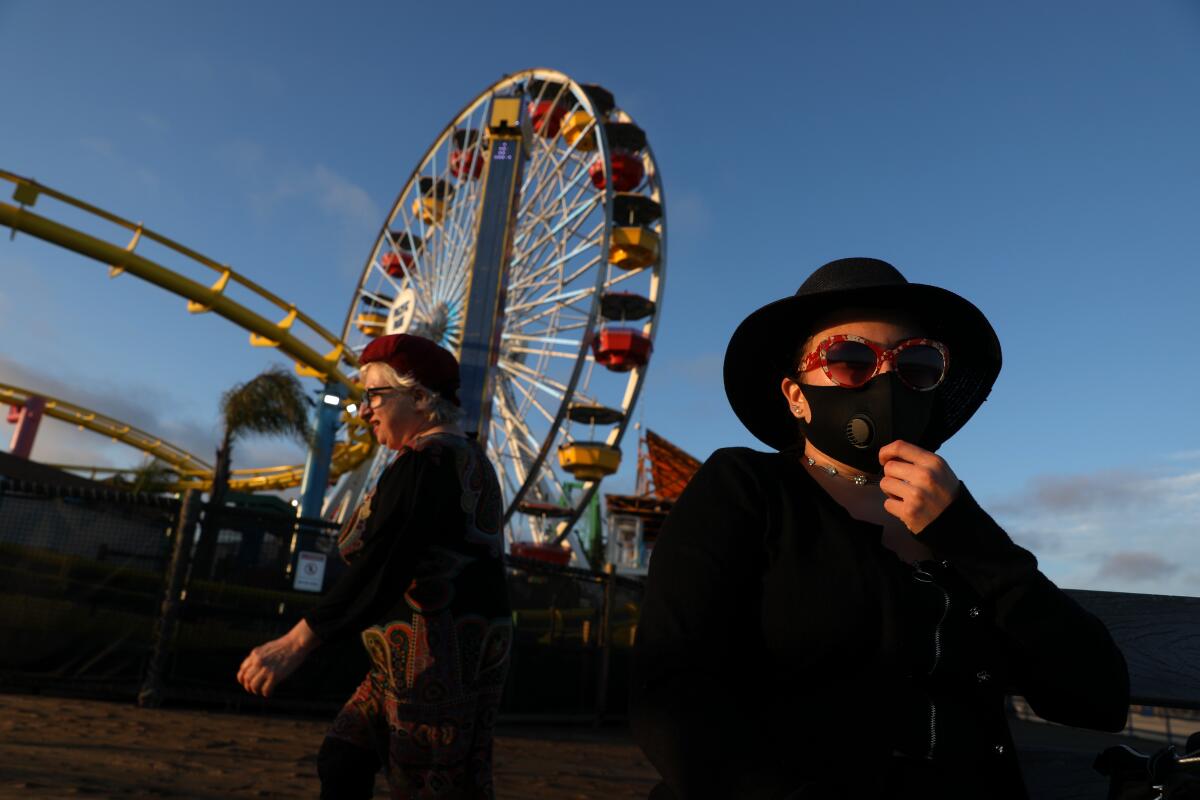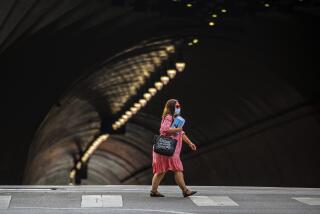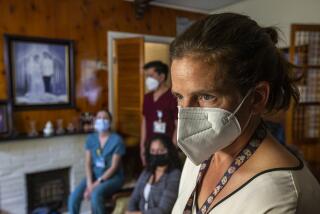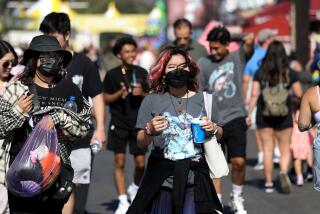Coronavirus cases continue to climb in L.A. County as bars are ordered to close

Los Angeles County public health officials on Sunday reported 2,542 more cases of COVID-19 and 20 related deaths. It was the county’s second-highest daily total of new cases since the pandemic began.
L.A. County has recorded a total of nearly 98,000 cases and more than 3,300 deaths, health officials said.
The rise came as Gov. Gavin Newsom ordered all bars in L.A. County, along with six other counties, to shut back down immediately in a bid to control the coronavirus’ increasing spread.
L.A. County planned to amend its health officer’s order Sunday to require that all bars, breweries, brewpubs, pubs, wineries and tasting rooms close unless they offer sit-down, dine-in meals, the county Department of Public Health said in a news release. Bar areas in restaurants will also be closed, officials said.
On top of the counties that were ordered to shut bars, eight others have been asked by state officials to issue local health orders closing bars, including Riverside, San Bernardino, Ventura and Santa Barbara.
“COVID-19 is still circulating in California and, in some parts of the state, growing stronger,” Newsom said in a written statement. “That’s why it is critical we take this step to limit the spread of the virus in the counties that are seeing the biggest increases.”
Though officials initially attributed L.A. County’s rising case numbers to more tests being performed, they now say the data can’t be explained by increased testing alone.
The timing of the sharp increase is in line with the reopening of certain sectors of the economy, including bars, where people tend to remove face coverings to drink and socialize with others who aren’t in their households, the Department of Public Health said Sunday.
“As we started reopening more businesses, we cautioned that we may need to change course to protect public health from this deadly virus,” L.A. Mayor Eric Garcetti wrote in a tweet supporting Newsom’s order.
Infections are also increasingly being identified in younger people, with 41% of cases now among those ages 18 to 40, according to the Department of Public Health. While people in that age group are at lower risk for serious illness and death, they can unknowingly infect friends or family members who are older or have underlying health conditions, officials said.
“While it’s disappointing to take a step back on our economic recovery journey, it’s critical that we protect the health of our residents and protect the capacity in our healthcare system,” Barbara Ferrer, the county health director, said in a statement.
She implored residents and businesses to follow public health directives, including wearing face coverings in public and keeping six feet away from others.
“Otherwise, we are quickly moving toward overwhelming our healthcare system and seeing even more devastating illness and death,” she said.
L.A. County’s rising numbers aren’t limited to daily new cases. Two other metrics that experts say are key in gauging the county’s progress in fighting the virus — hospitalizations and the percentage of people testing positive — also reflected increases that officials described as concerning.
A total of 1,717 confirmed COVID-19 patients were in county hospitals Sunday, compared with daily hospitalizations that had ranged from 1,350 to 1,450 in recent weeks. The county’s latest three-day average of daily hospitalizations represented an increase of 14%, according to its dashboard that tracks reopening metrics.
Meanwhile, the overall percentage of L.A. County residents testing positive for the virus since the start of the pandemic, which had been holding at 8% since May, rose to 9% Friday. The seven-day average percentage of people testing positive each day increased from 5.8% two weeks ago to 8.7% Sunday.
The increases mean that L.A. County is failing two more measures set by the state for counties to maintain a variance that allows them to relax stay-at-home rules more quickly.
The state flags a county for elevated disease transmission if its seven-day average of people testing positive for the virus rises above 8%. A county also is flagged if the average number of confirmed COVID-19 patients in its hospitals increases more than 10% over three days.
Furthermore, L.A. County has reported a rate of 231 new cases per 100,000 residents over the last 14 days, far higher than the state’s threshold of 25 new cases per 100,000 residents.
Neighboring counties have also seen a rise in new cases and hospitalizations.
San Bernardino County officials said Friday that local hospitals were beginning to reach “surge capacity” because of new COVID-19 cases, meaning they were getting close to hitting their licensed limits on available beds.
Riverside and Ventura counties also reported increases in COVID-19 hospitalizations, believed to be related to a variety of factors, including a rise in gatherings and outbreaks at skilled nursing facilities, officials said.
Orange County reported its highest one-day total of new cases Saturday, with 502. On Sunday, the county reported an additional 146 cases and three deaths, bringing its total to 12,608 cases and 326 deaths.
The county also reported a new high for hospitalizations Sunday, with 492 COVID-19 patients, 170 of them in intensive care. The latest three-day average of daily hospitalized patients released by the county represented an increase of nearly 16%.
The percentage of people testing positive for the virus each day also ticked upward, increasing from 6.3% on June 19 to 9.2% on Sunday, according to data released by the county.
Orange County has not yet been flagged by the state for its rise in disease transmission or hospitalizations. The state has flagged a total of 15 counties: Contra Costa, Fresno, Imperial, Kern, Kings, Los Angeles, Riverside, Sacramento, San Bernardino, San Joaquin, Santa Barbara, Santa Clara, Stanislaus, Tulare and Ventura.
More to Read
Sign up for Essential California
The most important California stories and recommendations in your inbox every morning.
You may occasionally receive promotional content from the Los Angeles Times.











